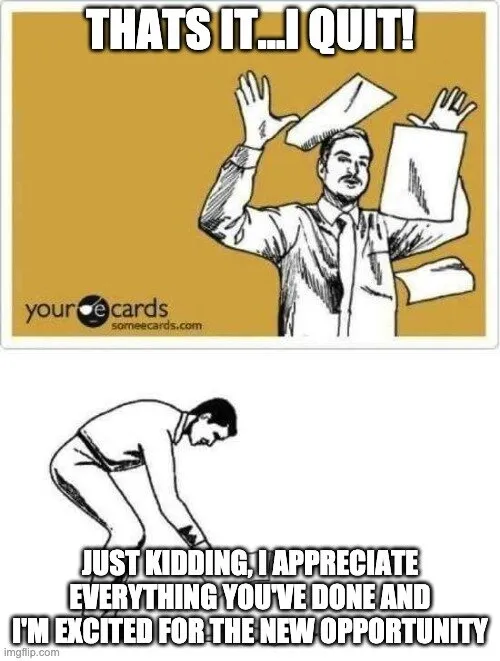What Not To Say In A Performance Review
Preparing what to say for your performance review is essential, but we would argue knowing what NOT to say is even more crucial. Are you saying something that’s making your boss cringe? Let’s find out!
Performance reviews are a great time to get feedback on your work throughout the year and express any concerns that have been front of mind. And while discussing these issues is essential, we sometimes tend to go a little overboard with the sharing.
Maintaining a solid relationship with your manager has its benefits, especially if your current job is tough. Regardless of the work bond you share, there still needs professionalism in the office - especially during a performance review.
Today, young professionals hold educated opinions that are often taken out of context. Between voicing these opinions and occasionally feeling too comfortable around leaders, cringe-worthy words can slip out when discussing how we think about our jobs.
What NOT to Say In A Performance Review (Feedback Discussion)
1. “I don’t want to work with them.”
Is the entire office going to get along? No. However, that’s the last thing your manager should worry about. If you have an issue with another colleague, work to resolve the conflict yourself.
Be the bigger person and take the initiative to find a solution.
One way to avoid a tricky situation altogether is to take time out of your day to learn more about the people you work with — on both a personal and professional level.
Note: If you're having a serious issue with harassment in the workplace, go to HR. If it's merely a matter of butting heads with a co-worker, do your best to settle the issue without dragging your boss along for the ride.
2. “That’s impossible.”
Here are a few uninspiring things to avoid saying to your boss: “We can't do that.”, “That can't be done.”, “There’s no way.”
Don’t be part of the problem. Instead, be part of the solution! “Anything is possible” should be the mindset of our generation. If you’re unsure about a task at hand, ask for help. Think outside the box; an answer will become clear.
3. “But we've always done it this way.”
The most ingenious people embrace change (that’s us millennials). Resorting to the same old thing repeatedly won’t work - not to mention anger the manager who hired you to be creative. Be yourself and try something different!
4. “I’m going to quit if I don’t get a raise.”

Unless you have a backup plan, it's unacceptable to threaten your employer with a bigger paycheck. There are other ways of asking for a raise, but an ultimatum isn't the answer.
If you can justify that the time put in is worth more than you’re making, preparing your resume and prepping for future interviews should be at the top of your todo list.
5. “I'm too tired.”
The workplace is an office, not your old college frat house. Even if you feel groggy (or hungover) on a Monday morning, you still need to put on a happy face and act professionally.
If you're running at 10%, avoid others until the grogginess passes.
The average annual hangover cost (due to missing work and poor job performance) per working adult is $2,000 (2000 study performed by Annals of Internal Medicine – Livescience.com).
6. “What should I do today?”
Stay busy during work hours, regardless of your workload. If you’re unsure what to do and want a fresh challenge, tell the manager that you're looking for more responsibility.
Volunteer to take on a new project or tackle an old task you’ve been pushing off.
Saying that you're bored and asking to be put to work can come across as lazy. Take the initiative and get to work. You’d be surprised at how fast the day goes when you stay busy!
7. “That's not part of my job duty”
If you want to piss off your manager, respond with, “That’s not my job,” when they ask for assistance. It sounds whiny, unprofessional, and self-absorbed (which we aren’t).
Everyone is working towards a common goal, so keep an open mind. If that means stepping out of your comfort zone, go for it!
Related:
Wrapping Up | Performance Review Phrases to Avoid
While we discussed several things you should not say during your following performance review, here are a few good questions your boss might appreciate.
-
What does the future of this role look like?
-
Are there any areas to expand into down the line?
-
What can I do to help achieve the career goals we discussed today?
-
If I hit each of the goals we laid out today, would I be eligible for a raise?
-
While I appreciate your straight forward way of getting things done, it can sometimes come off a bit harsh (only provide managerial feedback if they ask).
-
I had a few ideas on how we can grow the business. Should we set up another time to discuss them?
Hopefully, you’ve held back from saying the wrong thing during your performance review, but if not, keep it in mind for future discussions.
Use common sense moving forward, and when in doubt, stick with a professional attitude. You got this!
Title: What not to say in a performance review
Category: theGuidance
Tags: What Not to Say to Your Boss, How to Tell Your Boss You're Not Happy, How to Tell if Your Boss Doesn't Like You, Performance Review, Performance evaluation, what not to say in a performance review
Author: Reid is a contributor to theJub. He's an employment and marketing enthusiast who studied business before taking on various recruiting, management, and marketing roles. More from the author. | Author Profile




